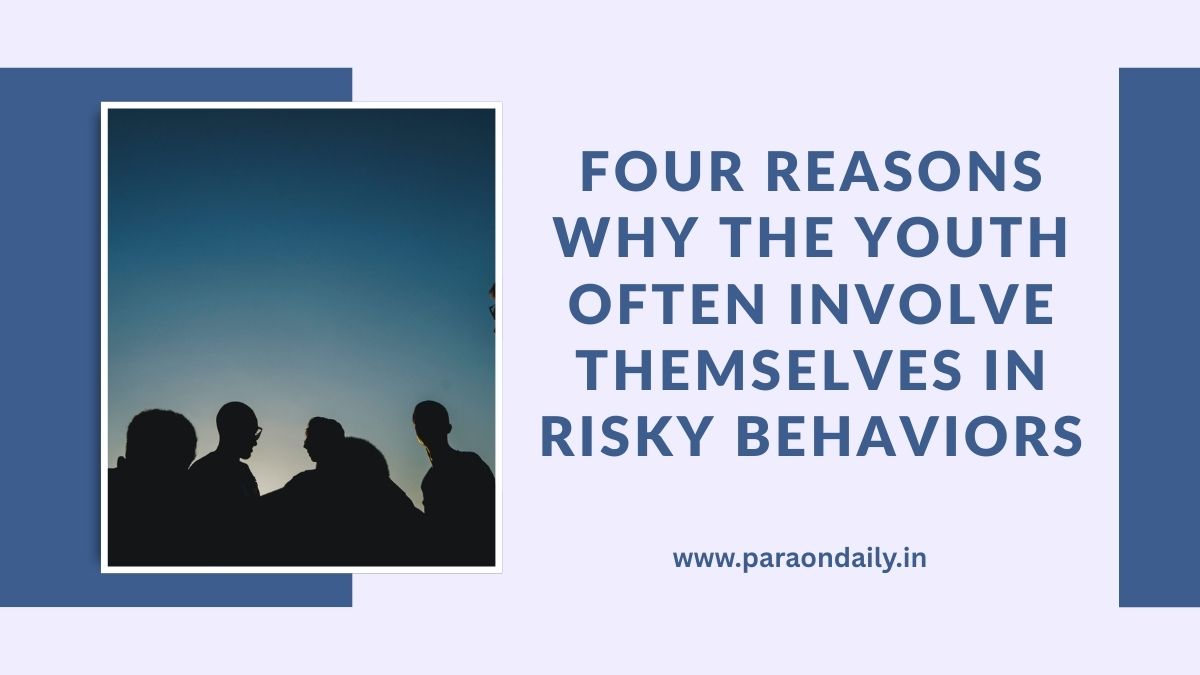Young people are full of energy, curiosity, and the desire to explore new things. While this stage of life is exciting, it can also be challenging because youth often face pressure from friends, society, and personal emotions. Many times, their decisions are not fully guided by experience, which can lead them to choices that are harmful or unsafe. This raises an important question: “State Four Reasons Why the Youth Often Involve Themselves in Risky Behaviors.” Understanding these reasons is important for parents, teachers, and society because it helps us guide young people toward safer and healthier lifestyles.
Let us now explore the key reasons behind this behavior in simple and clear terms.
State Four Reasons Why the Youth Often Involve Themselves in Risky Behaviors
1. Peer Pressure
One of the strongest reasons young people get involved in risky behaviors is peer pressure. At a young age, friendships are extremely important, and many youths want to feel accepted by their social group. Sometimes, friends may encourage them to try things such as smoking, drinking, or skipping school. Even if they know it is wrong, they might give in to avoid feeling left out.
Peer pressure can make a person act against their better judgment. It creates a strong influence where young people value approval from their peers more than making safe decisions. This desire to “fit in” often leads them into risky habits that they may regret later.
2. Curiosity and Desire for Exploration
Another major reason is curiosity. The teenage and youth stage is full of questions, excitement, and the urge to experience life in new ways. Young people often wonder about things they have heard of, such as alcohol, drugs, or even dangerous activities. This curiosity can push them into trying behaviors without fully understanding the risks involved.
For example:
- A youth might try alcohol just to see how it feels.
- Others may explore unsafe online content out of curiosity.
- Some may even attempt thrill-seeking activities without thinking about safety.
While curiosity is natural and important for learning, when it is not guided properly, it can expose young people to harmful consequences.
Also read: Describe How Emotional Factors Could Negatively Impact Your Personal Lifestyle Choices
3. Lack of Guidance and Support
A third important reason is the lack of proper guidance from adults. Many young people face difficulties when they do not have strong support systems at home or in school. When parents or teachers are too busy, strict, or unavailable, the youth often turn to other sources for advice—sometimes unreliable or harmful ones.
Without good role models, they may fail to understand the long-term effects of their actions. For instance:
- If no one explains the dangers of drug use, they may try it without fear.
- If they feel unheard, they may express emotions through unsafe choices.
- If they lack emotional support, they might look for comfort in harmful places.
Proper guidance is essential during this stage because it provides the balance between curiosity and responsibility.
4. Emotional Stress and Mental Health Struggles
The fourth major reason is emotional stress and mental health challenges. Young people today face pressures from academics, family expectations, relationships, and even social media. These pressures often lead to stress, anxiety, or feelings of loneliness.
When youth do not know how to manage these emotions, they may choose risky behaviors as an escape. For example:
- Stress from exams may lead to unhealthy habits like smoking.
- Loneliness may push them into unsafe online interactions.
- Anxiety may cause them to rebel against family rules.
In many cases, risky behavior is not about thrill-seeking but a way of coping with hidden struggles. This is why emotional health support is extremely important for the youth.
How Risky Behaviors Affect the Youth
Risky behaviors can bring temporary excitement, but they often result in negative outcomes. Some of the common effects include:
- Health problems such as addiction or injury.
- Poor academic performance due to loss of focus.
- Damaged relationships with family and friends.
- Legal troubles if the behavior involves breaking laws.
Understanding the risks is important so that the youth can make safer and wiser choices for their future.
The Role of Family and Society
Families and society have an important role in guiding young people. By offering strong support, good communication, and positive role models, adults can help reduce the chances of risky behavior. Some helpful steps include:
- Listening to the concerns of young people.
- Educating them about the dangers of unsafe choices.
- Encouraging healthy hobbies like sports, arts, and volunteering.
- Creating safe spaces where they feel accepted and valued.
When society works together to support the youth, risky behaviors can be reduced, and positive habits can grow stronger.
Ways Youth Can Protect Themselves
While guidance from others is important, young people can also take steps to protect themselves:
- Choosing friends wisely to avoid negative peer pressure.
- Practicing self-control and thinking before making decisions.
- Seeking help from parents, teachers, or counselors when facing stress.
- Engaging in positive activities that build confidence and reduce boredom.
By taking these actions, the youth can build stronger resilience against risky influences.
Why Awareness is Necessary
Awareness is the first step in prevention. When young people and adults understand why the youth often involve themselves in risky behaviors, they can prepare better solutions. Schools can organize workshops, families can have open conversations, and communities can create youth programs that promote healthy choices.
The more we discuss these reasons openly, the more we empower young people to make safe and responsible decisions for their future.
Also read: What Are at Least Two Ways Credit Card Companies Make Money?
Conclusion
When we try to “State Four Reasons Why the Youth Often Involve Themselves in Risky Behaviors,” the answers are clear. Peer pressure, curiosity, lack of guidance, and emotional stress are the main factors that push young people into unsafe choices. Each of these reasons reflects the challenges that come with growing up in a fast-changing world.
While risky behaviors may seem exciting in the moment, they can bring long-term problems for health, education, and relationships. By providing guidance, emotional support, and positive opportunities, families and society can help the youth avoid harmful paths. With awareness and care, young people can make lifestyle choices that lead to a bright and successful future.

